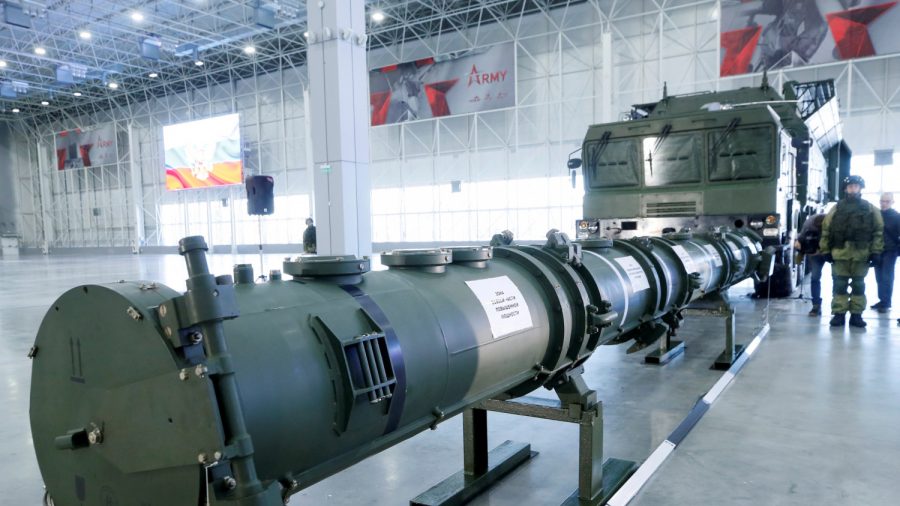WASHINGTON—Russian officials warned of the start of another arms race after the United States announced on Feb. 1 that it will be suspending its obligations under the Intermediate-Range Nuclear Forces (INF) Treaty, effective Feb. 2.
For six years, the United States has charged that Russia has violated the treaty, and the United States has held over 30 talks with Russian officials, including at the highest levels of government, to get Russia to come back into compliance, according to Secretary of State Mike Pompeo.
“Russia’s violation puts millions of Europeans and Americans at greater risk. It aims to put the United States at a military disadvantage, and it undercuts the chances of moving our bilateral relationship in a better direction,” Pompeo told reporters in Washington Feb. 1. “When an agreement is so brazenly disregarded and our security is so openly threatened, we must respond.”
Russia has long violated the Intermediate-Range Nuclear Forces Treaty, developing and fielding a prohibited missile system that threatens our allies and troops abroad. Tomorrow, the U.S. will suspend its obligations and begin the process of withdrawing from the treaty.
— The White House (@WhiteHouse) February 1, 2019
When President Ronald Reagan signed the treaty in 1987, it was the most detailed and stringent nuclear-arms-control treaty in history; the Soviet Union and the United States destroyed 2,692 missiles as a result. While the treaty has an unlimited duration, its inspection and monitoring provisions concluded in 2001.
Wаshington alleges that Moscow violated the treaty by testing and deploying the Novator 9M729 missile, which is called the SSC-8 by NATO. The INF treaty prohibits Russia and the United States from possessing short- and mid-range ground-launched missiles with effective ranges between 300 and 3,400 miles.
Pompeo alleges that Russia is still in “material breach of the treaty,” and that if it didn’t “return [to] real and verifiable compliance” within the next six months, the United States will pull out completely.
“Russia will not comply with the treaty unilaterally,” said Franz Klintsevich, deputy chairman of Russia’s Federation Council’s Committee for Defense and Security, the Moscow Times reported. “We’ll have to revive a number of medium- and short-range missile creation projects.”
“Yet another mechanism to avoid nuclear conflict has been destroyed,” said Konstantin Kosachev, the chairman of Russia’s Federation Council’s Committee on Foreign Affairs, according to the Moscow Times. “The U.S. has taken another step toward destroying the world.”
So far, President Vladimir Putin has not responded, but the Kremlin put out a statement saying that he discussed the announcement with “permanent members of the Security Council.” According to the list of attendees, this was a meeting between members of Russia’s Security Council and not the United Nations Security Council.
“They … had an in-depth discussion on strategic stability and international security in the context of the expected US withdrawal from the INF Treaty,” the statement reads.
Moscow maintains that Washington invented the violation in order to exit the agreement, something that would allow the United States to develop its own new missiles.
NATO has supported the United States in its position that Russia has not been complying with the treaty, the NATO allies say they “fully support” the United States suspending its INF treaty obligations.
“Unless Russia honors its INF Treaty obligations through the verifiable destruction of all of its 9M729 systems, thereby returning to full and verifiable compliance before the U.S. withdrawal takes effect in six months, Russia will bear sole responsibility for the end of the Treaty,” NATO said in a Feb. 1 statement. “We continue to aspire to a constructive relationship with Russia, when Russia’s actions make that possible.”
When asked if the United States had any plans to develop new agreements with Russia that would prevent an arms race, Pompeo said he didn’t see the point.
“It does no good to sign an agreement if a party isn’t going to comply with it. The piece of paper, if it’s not being complied with, doesn’t reduce the risk,” he said.
President Donald Trump said in a Feb. 1 statement that the United States stands “ready to engage with Russia on arms control negotiations,” as long as it advances the security of the United States and its allies, is verifiable and enforceable, and that all partners comply with the agreements.
“Once that is done, [we can] develop, perhaps for the first time ever, an outstanding relationship on economic, trade, political, and military levels. This would be a fantastic thing for Russia and the United States, and would also be great for the world,” read the White House statement.
With reporting by Ivan Pentchoukov. Reuters contributed to this report.


